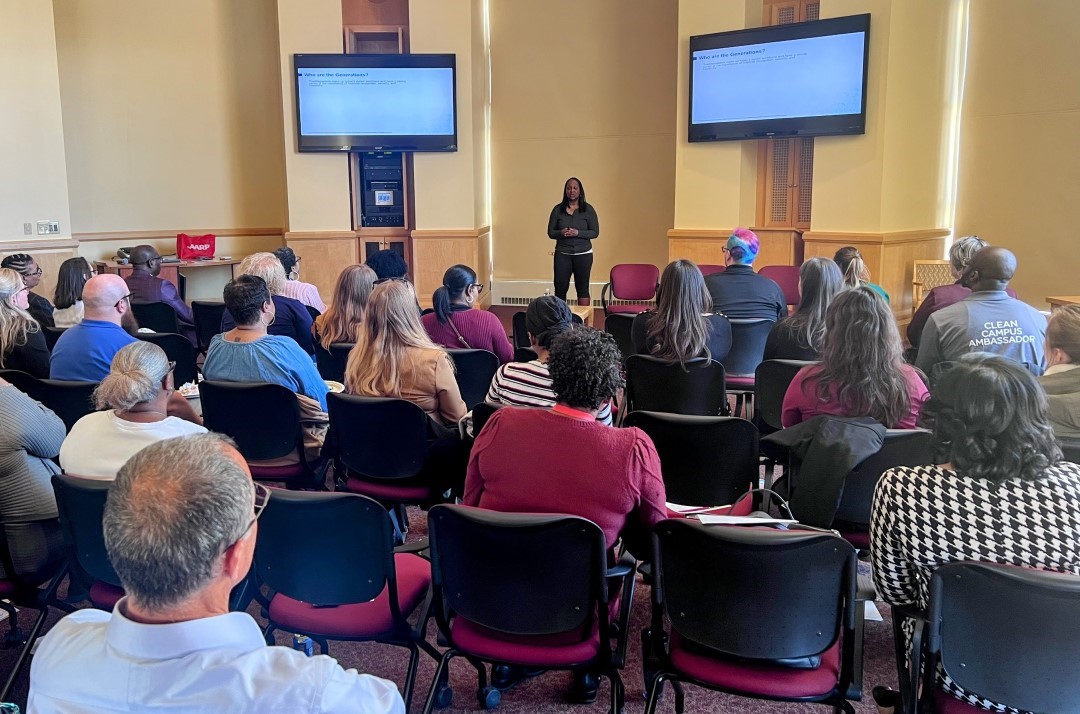A&F Success Office Hosts First Multi-Generational Workplace Workshops
July 07, 2025 Dan Reed
Attendees at two events were encouraged to share their personal experiences, ask questions in a safe environment, and recognize the unique value that each group brings to a team.
The Administration and Finance (A&F) Office of Employee and Organizational Success (the Success Office) hosted a workshop in March called “Being Part of a Multi-Generational Team." The event was designed to foster conversations among different generations in the University of Maryland, Baltimore (UMB) workplace.
Attendees were encouraged to share their personal experiences, ask questions in a safe environment, and recognize the unique value that each group brings to a team.
As the allotted time for the event wound down, it became obvious that those in attendance were not only learning a great deal, but that they genuinely wanted to continue the conversation. At the behest of the attendees, a follow-up session was planned a few weeks later.
The aptly titled follow-up event, “Being Part of a Multi-Generational Team, Part II” was recently held at the SMC Campus Center. Picking up where the original left off, the follow-up session proved to be just as engaging as the original.
Each event drew more than 70 participants across each of the five generations. While generational terms like Traditionalists, Baby Boomers, Generation X, Millennials, and Generation Z aren’t scientifically defined, the actual differences among the generations became obvious right from the start.
The discussions in both sessions were robust, respectful, honest, insightful, and occasionally challenging. While each generation brought their own unique perspective to the discussions, they all agreed on how much they got from the sessions.
Jake Broderick, an Environmental Health and Safety specialist, shared his experiences. “I enjoy workplaces where not everyone looks like me, or sounds like me, or has the same perspectives. It’s like the Great American melting pot analogy that I always go back to. It's interesting seeing different generations' perspectives because you also have socioeconomic divides, race, gender, and different sexual orientation divides that all play into how we see each other.”
He also observed how different groups can inadvertently perpetuate stereotypes.
“There was a millennial who was speaking at this event, but as soon as he got the microphone, he was interrupted. Five times. No one else got interrupted. Someone said that millennials don't speak up. But I reminded the group that you all interrupted him five times, right? It’s important that people know that they can be heard. Then we can jump in and feed off of each other's ideas.”
Broderick emphasized how much he appreciated the opportunity to sit down and have these discussions.
“I love that I can have these conversations with people, that I can be my authentic self, because I've worked places that I couldn't before. There was just so much good information that was flowing. People were bringing in their perspectives and challenging those preconceived notions.”
Nicole West, MBA, Student Financial Services supervisor, shared similar sentiments.
“Being in a multi-generational workplace has been both enlightening and grounding for me. As a millennial raised by baby boomer parents, I’ve always had a deep respect for traditional work values — like loyalty, showing up early, and putting in the hard work — which I carry with me to this day. But at the same time, I also value flexibility, purpose-driven work, and open communication, which are often hallmarks of my own generation.
"Working alongside other generations reminds me of the importance of experience, patience, and learning from history — things my parents instilled in me growing up. Meanwhile, collaborating with younger colleagues challenges me to stay adaptable, tech-savvy, and open to new perspectives. It’s helped me become a better communicator and more empathetic team member because I've learned to listen across different life stages, not just job roles. It’s taught me how to bridge gaps, find common ground, and respect that everyone brings something valuable to the table — whether it’s the wisdom of experience or the innovation of fresh eyes.”
The topics discussed across the 90-minute event included each generation’s unique strengths, common misconceptions held about other generations, and how significant cultural and societal events have shaped how each generation approaches work.
As the event drew to a close, Nicole Palmore, MSW, from the Success Office commented that this was “the most engaged audience she’d ever worked with." She encouraged attendees to continue the conversation by exploring other UMB communities tailored to young and mature professionals, and by participating in future events like town halls and social gatherings.
“It’s about empathy and communication. We hope everyone can approach different generations by assuming there are differences in how we all interact, to lead with curiosity, to be adaptable, and ultimately align around our shared goals,” she said.
For more information about A&F communities and resources, please visit the Success Office programs page here.